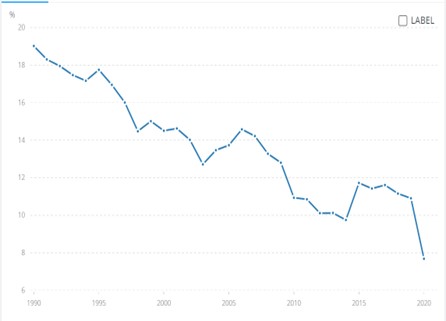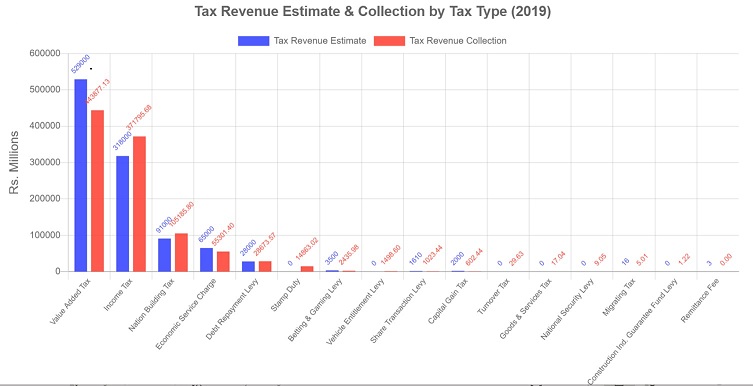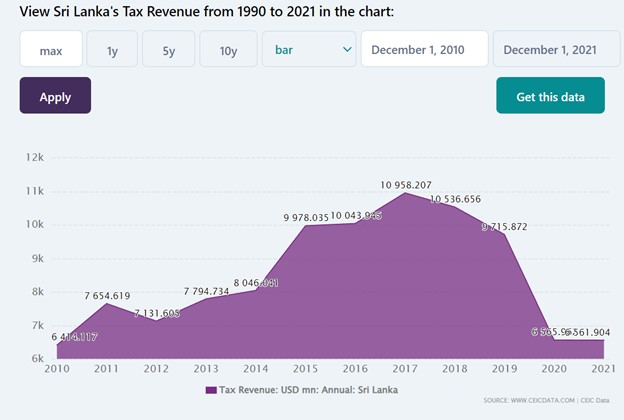Why not tax the informal rich rather than the formal poor?
Posted on February 20th, 2023
By Raj Gonsalkorale
While levying an income tax on individual earnings to supplement government revenue is a necessity to meet government expenditure, the issue in question is the perception and/or the reality of its unfairness and the lack of confidence and trust that people have about the way the tax they pay is spent by the government. There is no evidence that just and equitable approaches have been taken by politicians to address revenue raising and the curtailment of unaffordable expenditure in a systematic manner.
On the question of unfairness, many are of the opinion that there are a significant number of individuals who operate in a cash economy, with black and/or white cash, who either do not pay any tax, or pay a miniscule amount by declaring an income far less than their real income. Big guns in this group are said to include some specialist doctors, architects, engineers, lawyers, customs officials, tuition teachers, and officials of the department of motor traffic among others. A report of a specialist doctor who charges a huge amount of money in cash per patient for a procedure that takes less than 15 minutes underscores the massive earnings of some and the under reporting of income by professionals and government officials, the latter category obviously making their money via bribes, depriving the government of much needed revenue. There is anecdotal evidence of properties and luxury motor vehicles purchased for large sums of money, and extravagant expenditure incurred for weddings and other functions by individuals who apparently pay for these with cash.
On the same side of the coin of lost revenue, but on the corporate side, the Morning newspaper reported on the 13th of February (https://www.themorning.lk/articles/226383) that the government lost Rs. 560 mn in revenue due to tax concessions for listed companies in 2021/22.
Imesh Ranasinghe writing in the Morning stated that the Government of Sri Lanka missed out on Rs. 560 million in corporate income tax in the financial year 2021/22 from 13 companies that enjoyed a 50% tax concession for being listed on the Colombo Stock Exchange (CSE) in 2021, financial statements of the listed companies revealed. As per the financial statements of the said 13 companies to which the concessions were granted for being listed on the CSE between May-December 2021, First Capital Treasuries PLC and Capital Alliance PLC recorded losses for the financial year 2021/22, while Lanka Credit and Business Finance PLC LOLC General Insurance paid deferred taxation charges. Some of the major companies that enjoyed higher taxation benefits include LOLC General Insurance PLC, which had earned a profit before tax (PBT) of Rs. 1.2 billion and had only paid Rs. 170.6 million under the concessionary tax rate after paying Rs. 413.5 million as taxes in 2022. Prime Land Residencies PLC had made a PBT of Rs. 1.8 billion and had paid Rs. 162 million as taxes from Rs. 289 million in 2020 and Cooperative Insurance PLC paid Rs. 97 million as corporate income tax from a PBT of Rs. 933 million after paying Rs. 260 million as taxes in 2020”.
This example of loss of tax revenue from 13 companies maybe the tip of an iceberg as there could be other companies, smaller and bigger, who have paid less tax although their revenue was higher and their profit before tax was higher, and companies which are unlisted who may have not paid or paid less taxes although their revenues and profit before tax were higher than previous years.
In the context of the individual and corporate situations noted, increasing income tax from those at the bottom end of the income/revenue scale cannot be regarded as a fair proposition. As per the International Monetary Fund, Government Finance Statistics Yearbook and data files, and World Bank and OECD GDP estimates, the tax revenue in Sri Lanka had dropped to 7.7% of GDP in 2020 from 19% in 1990 as illustrated in the graph below. The revenue in 2022 was reported at 7.6 % of GDP in Sep 2022. As the graph depicts revenue has been steadily declining since 1990

Economynext in an article state that quote Sri Lanka has aimed at increasing tax revenue by 69 percent to fund government spending in the crisis-hit economy, but analysts say the 2023 budget failed to address core issues on excess spending and articulate strong policies on restructuring loss making state owned enterprises (SOEs). The budget has aimed at increasing tax revenue by 69 percent to 3,130 billion rupees next year from this year’s 1,852 billion rupees while bringing down the budget deficit to 7.9 percent in 2023 from this year’s revised 9.8 percent. The high tax revenue target comes as millions of Sri Lankans face the impacts of the ongoing economic crisis – 66 percent inflation, job losses, and shrinking disposable income, unquote (https://economynext.com/crisis-hit-sri-lanka-targets-more-tax-revenue-in-2023-budget-concerns-on-soes-spending-remain-102740/).
These factors portend even more of a difficult period in the coming years as no one appears willing and/or able to take the difficult decisions that must be taken to yield an effective course correction that will take the country out of the economic mess it is in. However, the pain of such decisions cannot fall unjustly on ordinary people who are already in great pain, while some segments of the society enjoy a largesse that is both embarrassing and unkind to those who are struggling to find their next meal.
The following table on tax revenue estimate and collection by tax type (2019) published in lankastatistics (https://lankastatistics.com/economic/tax-revenue-by-tax-types.html) gives an insight into the contribution to tax revenue from different categories. As can be seen, value added tax and income tax comprises nearly 90% of the tax estimated and collected.

Value added tax also contributes to the unfairness of tax because of its regressive nature. The Tax Policy Centre, a joint venture of the Urban Institute and Brookings Institution made up of nationally recognized experts in tax, budget, and social policy who have served at the highest levels of government.
In a briefing book (https://www.taxpolicycenter.org/briefing-book/who-would-bear-burden-vat), it states, because lower-income households spend a greater share of their income on consumption than higher-income households do, the burden of a VAT is regressive when measured as a share of current income: the tax burden as a share of income is highest for low-income households and falls sharply as household income rises. Because income saved today is generally spent in the future, the burden of a VAT is more proportional to income when measured as a share of income over a lifetime. Even by a lifetime income measure, however, the burden of the VAT as a share of income is lower for high-income households than for other households. A VAT (like any consumption tax) does not tax the returns (such as dividends and capital gains) from new capital investment, and income from capital makes up a larger portion of the total income of high-income households”.
If Sri Lanka is serious about an equitable and a fair tax system, it needs a complete overhaul of the system and not patchwork changes at the behest of external agencies. The morally and politically bankrupt politicians and special interest groups may not wish for such an overhaul and the country would continue its debilitating slide into further trouble despite the best efforts of a few.
Firstly, if as suspected, a significant number of high earners are either not paying their fair share of income tax or not paying any income tax, that loophole needs to be fixed. There are measures that could be considered. The idea of levying a tax at the source could be considered for professionals who deal in cash payments. For example, unless a law exists, a new law could be brought in to make it compulsory that doctors see patients only in hospitals or certified medical or home practices, and that ALL cash or credit card transactions are recorded as auditable, legal documents. If patients are seen or treated at a hospital or a similar medical institution, the attending doctor SHOULD be paid by the institution and no direct patient transactions should be permitted. The hospital in these instances could be compelled by law to deduct a percentage of the doctor’s fee as a tax, with the doctor permitted to disclose this payment in their annual tax returns. A similar methodology could be adopted with some variations to other high earners by way of a registration process where and all such registered individuals are required to submit periodic returns to the Inland Revenue department.
Government officials who become high earners through bribe taking will be harder to rope in although in their case as well as in the case of professionals, strict asset tests conducted by the tax office, and also bank disclosures on ALL cash deposits over a given amount, plus a tax levy imposed when deposits are made, for deposits over a given value, could be some of the plugs that can be used to close loopholes.
In all cases it is vital that penalties for violating existing and new tax laws are very stringent and they include jail terms and confiscation of assets including any unlawfully held cash assets in the name of the individuals. As suspected, if such assets are written in the name of relatives or friends of the individuals concerned, such persons should be called upon to explain and justify how they managed to acquire such assets.
Secondly, value added taxes needs to be revised and redress given to individuals when they purchase essentials. Instead, a tax overhaul could investigate increasing value added taxes for functions held in hotels and function halls. It is no secret that vast sums of money are spent on these functions. Many such spending is unconscionable and an affront to the hundreds and thousands of ordinary people who do not have money for their basic, routine meals. However, rather than focusing on the morals and ethics of such high spenders, as that would be more or less water off duck’s backs, charging a high value added tax would at least allow the government to support the most vulnerable with such funds. To the best of the writer’s knowledge, no surveys have been carried out to ascertain the revenue to hotels and function centres from such functions.
The tax office could undertake such a survey to ascertain the current and potential value added tax collection from such venues. A tax overhaul should naturally include corporate taxation and a re look at concessions provided and how a situation reported in the Morning newspaper described earlier could be addressed. CEIC Unlimited
(https://www.ceicdata.com/en/indicator/sri-lanka/tax-revenue) states the following
- Sri Lanka Tax Revenue was reported at 6.562 USD bn in Dec 2021.
- This is a decrease from the previous figure of 6.566 USD bn for Dec 2020.
The decline in tax revenue is shown in the illustration below. The corporate tax component and individual income tax component is not mentioned here, and this is something that needs to be examined to ascertain the contribution from the corporate sector and if the Morning article is to be taken as perhaps the tip of the iceberg, the potential loss of income tax from the corporate sector.

Clearly, it appears that there are some individuals who earn vast amounts of money but hardly pay reasonable income taxes, corporate earnings and profits are not consistent with taxes paid, there is no assessment of the income of some individuals who purchase high value properties and other assets and whether they have fulfilled their tax commitments. On the other hand, successive governments seem to have and still are taking the easy way out by taxing wage earners.
If the country is serious about increasing its revenue base from taxes, it should engage in a complete overhaul of the tax system, strengthen the hand of the tax department by way of suitable legislation and introduce serious punitive measures to punish individuals and corporate entities who firstly do not declare their real income, and secondly who do not pay their fair share of taxes. The VAT system too should be revised in such a way that the most vulnerable are safeguarded from the regressive nature of the VAT system.